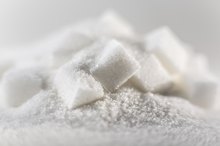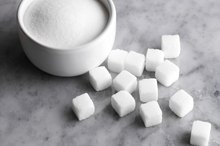What does fact checked mean?
At Healthfully, we strive to deliver objective content that is accurate and up-to-date. Our team periodically reviews articles in order to ensure content quality. The sources cited below consist of evidence from peer-reviewed journals, prominent medical organizations, academic associations, and government data.
The information contained on this site is for informational purposes only, and should not be used as a substitute for the advice of a professional health care provider. Please check with the appropriate physician regarding health questions and concerns. Although we strive to deliver accurate and up-to-date information, no guarantee to that effect is made.
Organic Compounds That Must Be in the Diet
Organic compounds are ones based on the elements hydrogen and carbon. Though the compounds may contain other elements, such as nitrogen, phosphorus or oxygen, all organic molecules are based on a hydrocarbon backbone. Organic molecules make up a significant portion of your diet, and they are found in all the foods you eat. A number of organic molecules are required in your diet to keep your cells and tissues healthy.
Proteins
One type of organic molecule that must be present in your diet is protein. Proteins are made up of chains of organic molecules, called amino acids. Your body uses combinations of 20 different amino acids, arranged in specific sequences, to make the thousands of unique human proteins present in your cells and tissues. Protein in your diet is important to provide a source of amino acids -- protein is broken down within your stomach and small intestines, and the amino acids that make up that dietary protein are absorbed into your body and used to make your own proteins. Proteins are found in meat as well as beans and legumes, and the Harvard School of Public Health recommends consuming 0.8 to 1 g of protein in your diet for every kilogram of body weight to help maintain healthy cells and tissues.
- One type of organic molecule that must be present in your diet is protein.
- Protein in your diet is important to provide a source of amino acids -- protein is broken down within your stomach and small intestines, and the amino acids that make up that dietary protein are absorbed into your body and used to make your own proteins.
Lipids
Is Glucose Stored in the Human Body?
Learn More
Another essential type of organic molecule you must consume in your diets are lipids. Lipids may come in the form of fats, usually from animal sources, or oils and waxes derived from plant sources. Many plant and animal fats are found in the form of triglycerides -- three fatty acid chains, each bonded to a glycerol sugar backbone. Lipids can provide a source of energy for your cells, and also have role in proper tissue maintenance and functioning. There are two types of essential fatty acids: omega-3 and omega-6 1. According to the Linus Pauling Institute at Oregon State University, omega-6 fatty acids are found in safflower and sunflower oils, while omega-3 fatty acids are found in walnut oil, nuts and fish 1.
- Another essential type of organic molecule you must consume in your diets are lipids.
- Many plant and animal fats are found in the form of triglycerides -- three fatty acid chains, each bonded to a glycerol sugar backbone.
Carbohydrates
Carbohydrates serve as a source of energy for your cells -- upon consumption, your body metabolizes carbohydrates into glycogen and glucose, which provide energy to keep your body running. The Franklin Institute explains that your brain relies on glucose to function, and a lack of carbohydrates in your diet can lead to diminished cognitive ability. When eating carbohydrates, choose foods made from whole grains such as 100 percent whole wheat bread, or natural sources of sugar, such as fruit.
Related Articles
References
Writer Bio
Sylvie Tremblay holds a Master of Science in molecular and cellular biology and has years of experience as a cancer researcher and neuroscientist.









